- Home
- McBain, Ed
Bread (87th Precinct) Page 18
Bread (87th Precinct) Read online
Page 18
“Why would I refuse? I never heard of Erhard Bachmann, and I never delivered any money to him.”
“Then how do you know his full name?” Carella said instantly.
“What?” Rosalie said.
“How do you know it’s Erhard Bachmann?”
“Erhard’s a common German name,” Rosalie said.
“So’s Fritz,” Ollie said.
“I…I don’t know how I happened to…to guess it.”
“Maybe she’s in this deeper than we figured,” Ollie said, in an apparent confidential aside to Carella.
“Maybe so,” Carella said. “You think we can charge both Worthy and her?”
“I don’t see why not,” Hawes said.
“Charge me with what?” Rosalie said.
“Arson. Accessory to the crime of arson.”
“I didn’t have anything to do with burning down Grimm’s warehouse,” Rosalie said. “All I did…”
“Yeah, what? Ollie said.
“I took the money to Germany.”
“What money?”
“The money Alfie gave me.”
“Who’s Alfie? Are you talking about Chase?”
“Yes.”
“You took money from Chase and delivered it to Bachmann?”
“Yes.”
“Cash?”
“Yes.”
“How much?”
Rosalie hesitated.
“How much, goddamnit!” Ollie shouted.
“Half a million dollars,” Rosalie said.
“For what? What was Chase buying?”
“I don’t know. I only had instructions to deliver the money.”
“Whose money was it? Chase’s or Diamondback Development’s?”
“I don’t know.”
“Let’s put it another way, Miss Waggener. Did Oscar Hemmings or Robinson Worthy know about your trip to Germany?”
“No.”
“They did not know you went to Germany with five hundred thousand dollars that Chase gave you?”
“That’s right.”
“I thought you were living with Hemmings.”
“I am. I told him I was going to the Coast, to visit my mother.”
“Why’d you lie to him?”
“Because he…he can get mean sometimes. He…beats me sometimes.”
“What’s with you and Chase?” Ollie asked.
“Nothing.”
“Nothing? And he handed you five hundred grand to take to Germany for him? Come off it, sweetie!”
“All right, we…we have a thing.”
“Does Hemmings know about this ‘thing’?”
“Of course not.”
“You’re fooling around with Chase behind Hemmings’s back, is that right?”
“We’re not fooling around, we’re in love.”
“Oh, forgive me,” Ollie said, bowing from the waist. “I didn’t realize it was love. Please do forgive me.”
“Why didn’t you tell Hemmings you were going to Germany?” Carella asked.
“Alfie asked me not to.”
“Was it Alfie’s own money you took to Germany?”
“I don’t know.”
“Well, if Alfie asked you not to tell his partners about the trip to Germany…”
“That’s right.”
“Then it must have been his own money, wouldn’t you say? Unless he stole it from the company.”
“Alfie is not a thief!”
“Then it was his own money, right?”
“I guess so.”
“Yes or no?”
“Yes.”
“He told you it was his own money?”
“Yes, he told me.”
“Where’d he get that kind of money?”
“I don’t know.”
“Why’d he give it to Erhard Bachmann?”
“I don’t know.”
“You don’t know anything about the deal with Bachmann?”
“Nothing.”
“Has it got something to do with little wooden animals?”
“I don’t know.”
“Why’d you double-cross Hemmings?” Hawes asked.
“I didn’t!” Rosalie said indignantly. “Alfie offered me something better, that’s all.”
“Better than marriage?”
“Marriage? What are you talking about?”
“You said you and Hemmings were engaged.”
“No,” Rosalie said. “I work for him, pure and simple. I’m a whore, okay? I’m part of a stable, okay? And I’m sick of it. Which is why I threw in with Alfie.”
“How many girls in the stable?” Ollie asked.
“About thirty.”
“All in that building on Saint Sebastian?”
“No. There’re only twelve of us there. Oscar’s got two other places, I don’t know exactly where.”
“Who’s on the take?” Ollie asked.
“I don’t know what you mean.”
“Who’s the cop being paid off? You can’t have a steady stream of Johns marching into a building without somebody noticing. Now, who’s being paid off?”
“It’s not a steady stream,” Rosalie said. “It’s a very high-priced operation.”
“How much do you get?”
“Two, three hundred a night.”
“And you say Alfie offered you a better deal?”
“Not that kind of deal. Not prostitution. He promised he’d talk to Oscar and get me out of the life. He said if I stuck with him there’d be lots of money for both of us in the future.”
“Money?” Ollie said. “My, my. And here I thought it was only love.”
“Money, too,” Rosalie said.
“How much money?”
“Alfie said there’d be millions. He said he’d be a millionaire.”
“Where’d Alfie get the five hundred grand he sent to Germany?” Ollie asked.
“I don’t know.”
“Is he in on the whorehouse operation?”
“No. That’s Oscar’s alone.”
“Is Oscar the moneyman behind Diamondback Development?”
“I think so. I don’t know. I really don’t know too much about the company’s finances.”
“Are they buying those buildings to convert into whore-houses?”
“I really don’t know.”
“But you said they’re not into that end of it. That’s Oscar’s alone.”
“That’s right.”
“So what are they into?”
“I don’t know.”
“What’s Alfie’s business with Erhard Bachmann?”
“I don’t know.”
“Was Bachmann expecting you when you got to Germany?”
“Yes. But I used a phony name. Alfie told me to use a phony name.”
“What did Bachmann say when you gave him the money?”
“He said ‘Danke sehr.’ ”
That was the end of their little chat with Rosalie Waggener. They figured, by that time, that she had either told them all she knew or all she was willing to tell. They thanked her very much (in English), and asked her to wait in the room down the hall. From what they could gather, Chase and Grimm seemed to be equal partners in the little-wooden-animal business. Without Worthy and Hemmings knowing about it, Chase had paid $500,000 of his own money to Grimm’s packer in Germany, and Grimm (before his devastating warehouse fire) had been ready to pay another $500,000 for the cargo when it reached America. According to Grimm’s own estimate, the resale value of the cargo was one million dollars. The three cops investigating the case knew very little about high-level business transactions involving astronomical figures. They knew only that tangled are the webs we weave when first we practice to deceive, and they further knew that nobody invests a million bucks hoping merely to break even.
It looked like time for a little game of poker.
Ollie found Oscar Hemmings in the apartment he shared with Rosalie, supervising the repair of the broken door lock. The locksmith got very nervous when he saw the
gun in Ollie’s hand. He dropped his screwdriver, and then immediately began packing his tools. Hemmings, in his shirt sleeves, the collar of the shirt open, the sleeves rolled up, the monogram O. H. over the breast pocket, very calmly asked Ollie what the trouble was.
“The trouble is murder,” Ollie said. “And arson.”
“I thought you’d already arrested Charlie Harrod’s killers.”
“That’s right,” Ollie said. “But let’s talk about it at the station house, okay? Some of your friends’ll be there, we’ll have a regular afternoon tea party.”
Hemmings shrugged, and Ollie followed him inside, gun leveled at him, while he rolled down his sleeves, buttoned his collar, and put on a tie and jacket. By the time they came out into the hallway again, the locksmith had disappeared.
“He didn’t fix the lock,” Hemmings said conversationally.
“You don’t have to worry,” Ollie said. “Where you’re going, they got plenty of locks.”
Ollie was playing it very big. They already had enough on Hemmings to charge him with Keeping a Disorderly House and possibly with Living on the Proceeds of Prostitution (though here he would most likely claim that even though he was living with a prostitute, he had other means of support—his interest in Diamondback Development, for example). But both these offenses were only misdemeanors, and the cops had decided before embarking on their roundup that they were going for broke. By the time Ollie arrested Hemmings, a peculiar internal metamorphosis had taken place; he had begun believing they already had enough on this whole phony bullshit Diamondback Development operation to charge its partners with arson and homicide.
Hawes fell victim to the same euphoric sense of certainty when he arrested Robinson Worthy. The telephone book listed Worthy’s address as 198 North 27th Street, and that was where he found him at ten minutes past 6:00. Worthy was shaving. He came to the door wearing trousers and an undershirt, his face covered with lather. Hawes was holding a gun in his hand. Worthy said, “What’s that for?”
“We want to ask you a few questions downtown,” Hawes said.
“You don’t need the gun,” Worthy said.
“I know I don’t. We’ve got enough without it.”
“Can I finish shaving?”
“Nope,” Hawes said. “Just wipe it off.”
By the time Roger Grimm arrived at the squadroom, Hawes and Ollie were both riding so high you would have thought the DA had already brought in multiple convictions. Grimm stopped at the slatted railing, looked into the room, saw the detectives sitting at a desk with Worthy and Hemmings, and said, “All right to come in?”
“Please do,” Hawes said. “Glad you could come over, Mr. Grimm.”
He went to the railing, opened the gate for Grimm, and led him in. Grimm had been called earlier and asked if he could come to the squadroom on a matter pertinent to his arson case. He had, of course, readily agreed to be there at the appointed hour. He did not yet know that he was suspected of some high-handed double-dealing with Chase. Had he known, he might have been as apprehensive as Worthy and Hemmings looked. The reason for their nervousness was quite simple. The totally unfounded and somewhat giddy confidence emanating from Ollie and Hawes had completely unsettled the Diamondback partners.
“Ollie,” Hawes said, “this is Mr. Roger Grimm, the man who had the fires.”
“How do you do?” Ollie said politely, and rose and took Grimm’s hand. “It’s a pleasure to meet you, I’ve heard so much about you.”
“Good things, I hope,” Grimm said, and smiled weakly. The confidence was beginning to affect him, too. It was as palpable as an electric current racing around the room. If you touched either of these two cops, you could be electrocuted on the spot.
“And these gentlemen are Mr. Robinson Worthy and Mr. Oscar Hemmings, partners in a venture known as Diamondback Development. Mr. Worthy, Mr. Hemmings, Mr. Grimm,” Hawes said, and smiled pleasantly.
The men looked at each other. Since Worthy and Hemmings were partners of Chase, and since Grimm was also a partner of Chase, it seemed obvious to the cops that the three of them had at least heard of each other. But it now also seemed apparent that this was the first time any of them had met face to face. The confrontation seemed to unsettle Worthy and Hemmings even further. Grimm looked a trifle uncertain as he said, “Pleased to meet you.” Worthy and Hemmings nodded, and Grimm’s uncertainty turned to wariness.
“Well, what do you think?” Ollie said. “Shall we start without Steve?”
They had already decided that the arrival of Chase would be their surprise card, revealed at the last moment, when the stakes were high and the pot was closed. Carella had told them he would be back at 7:00 sharp. They had asked Grimm to be at the squadroom at 6:45 and it was now 6:50 and the game of poker was about to begin. The interrogation that followed was a peculiar one. Ollie and Hawes played the game as if they were holding a pat royal flush, even though they still needed an essential card—Chase. Worthy and Hemmings, frightened by the wild assurance with which the cops were betting and raising, assumed that their own hands were terrible, whereas in fact they weren’t too bad at all. Grimm, sitting with a pair of deuces, watched the proceedings like an out-of-town hick who had been sucked into the game without realizing the stakes were high and the company fast. It was all very peculiar.
“Okay, Mr. Worthy,” Ollie said, “you want to tell us why you spent time with Frank Reardon?”
“I don’t know anyone named Frank Reardon,” Worthy said.
This was good for the cops. He was starting with a bluff.
“That’s not true,” Hawes said. “You visited Frank Reardon several times in the company of Charlie Harrod.”
“Who says so?”
“We have positive identifications from a woman named Barbara Loomis, who’s the super’s wife in Reardon’s building.
“Well,” Worthy said, and shrugged.
“Were you there to see him, or weren’t you?”
“Yes, I was there. That doesn’t mean anything.”
“It means you went to visit a person who was employed as a watchman in Mr. Grimm’s warehouse,” Hawes said. “Isn’t that right, Mr. Grimm?”
“That’s right,” Grimm said. He looked puzzled, as though trying to determine whether or not his deuces were worth betting.
“Well, Frank Reardon was a friend of mine,” Worthy said.
“Did you know he worked for Mr. Grimm?”
“No.”
“I thought he was a friend of yours,” Ollie said.
“Yes, but I didn’t know where he was employed.”
“Do you know what Frank Reardon did on August seventh?”
“No,” Worthy said. “What did he do?”
“Do you know what he did, Mr. Hemmings?”
Hemmings lighted a cigarette before answering. Then he blew out a stream of smoke and said, “I don’t know Frank Reardon, and I’m sure no one can testify that I ever visited him.”
“That’s right,” Ollie said. “You’re absolutely right. No one ever saw you there. All we know is that Harrod, and Mr. Worthy here, went to see Frank Reardon. But neither of you know what Reardon did on August seventh, is that correct?”
“That’s correct,” Worthy said.
Hemmings nodded and drew in on his cigarette again.
“On that day,” Hawes said, “Frank Reardon put an unspecified amount of chloral hydrate into a bottle of whiskey.”
“He was paid five thousand bucks to do that,” Ollie said. “He was paid on August second.”
“He was later shot to death with a Smith and Wesson 9-mm Automatic owned by Charlie Harrod,” Hawes said.
“Is that true?” Grimm asked, surprised.
“Yes, that’s true,” Hawes said.
“Then you know who killed Frank?”
“Yes, Mr. Grimm, we know who killed him.” Hawes did not bother to explain that they only knew whose gun had killed him. This was no time for playing according to Hoyle, not when so many chips were
on the table.
“Then you must also know…”
“Patience, Mr. Grimm, patience,” Hawes said.
“But why was he killed?” Grimm persisted. His deuces were beginning to look good again. He was even contemplating raising the pot a trifle.
“Because he knew exactly how your night watchmen were put out of action,” Hawes said.
“Isn’t that right, Mr. Worthy?” Ollie said.
Worthy did not answer. He had decided to stand pat with an eight-high diamond flush.
“Mr. Hemmings is beginning to feel neglected,” Hawes said.
“We’re coming to you, Mr. Hemmings,” Ollie said. “And your whorehouses. And your high-priced little bimbo, Rosalie Waggener. And her trip to Germany.”
“What trip to Germany?” Hemmings said, calling and raising. He had a full house, aces up, and he was betting the cops did not hold the case ace that would complete their royal flush.
“Oh, didn’t you know about that?” Ollie said. “Gee, didn’t she tell you about that? About her trip to Bremerhaven? About taking five hundred thousand dollars to Bremerhaven?”
Worthy and Hemmings had looked at their cards the moment Ollie had mentioned Bremerhaven, and immediately began studying the huge pile of chips, when they heard about the five hundred thousand dollars delivered there. Roger Grimm, on the other hand, had begun to go pale the moment he heard Rosalie Waggener’s name. He now looked positively ill. He was a man suddenly realizing that a pair of deuces wasn’t worth a rat’s ass in this kind of poker game. Hemmings was the first to regain his cool. His full house might still be good; recklessly, he raised again.
“Rosalie’s never been to Germany in her life,” Hemmings said.
“She went to Germany on July twenty-fifth,” Hawes said. “We’ve seen her passport, and she’s already told us where she went.”
“To where, did you say?”
“To Bremerhaven.”
“Why would Rosalie have gone to Bremerhaven?” Hemmings asked, raising again.
“To deliver that five hundred thousand to a man named Erhard Bachmann,” Hawes said.
“Know him, Mr. Grimm?” Ollie asked.
“Yes, I…yes. He’s my packer. He packs my…my wooden things.”

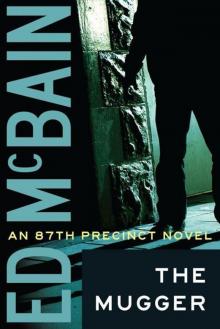 87th Precinct 02 - The Mugger
87th Precinct 02 - The Mugger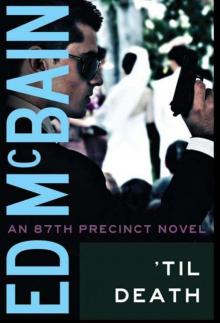 87th Precinct 09 - Til Death
87th Precinct 09 - Til Death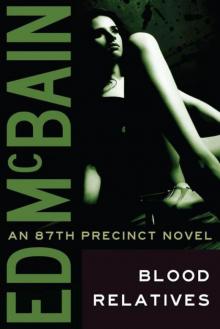 Blood Relatives (87th Precinct)
Blood Relatives (87th Precinct) Killer's Payoff
Killer's Payoff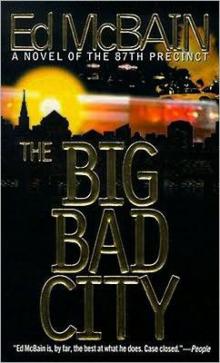 The Big Bad City
The Big Bad City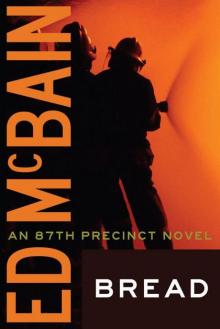 Bread (87th Precinct)
Bread (87th Precinct)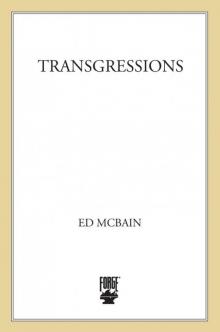 Transgressions Vol. 3
Transgressions Vol. 3 Runaway
Runaway So Long As You Both Shall Live (87th Precinct)
So Long As You Both Shall Live (87th Precinct)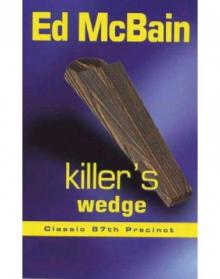 Killer's Wedge
Killer's Wedge